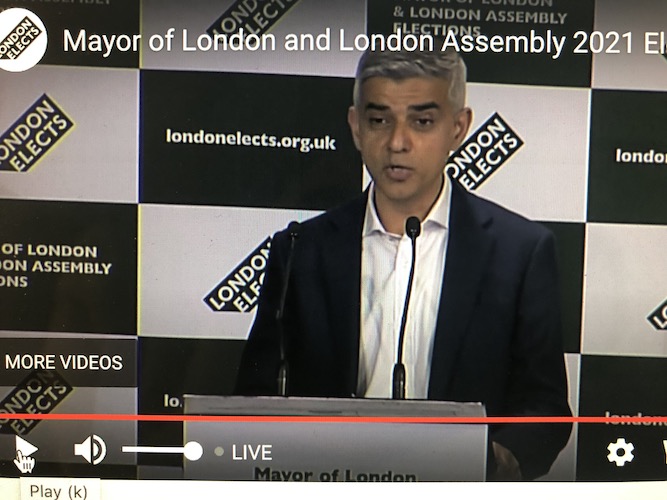Sadiq Khan has won a second term as Mayor of London with a comfortable victory over his nearest rival that will see him continue as the UK capital’s political leader for a further three years.
A contest delayed by a year by the pandemic ended with decisive endorsement of the Labour incumbent, who secured 55.2 per cent of votes in a second round run off compared with the 44.8 per cent of Conservative Shaun Bailey.
Khan’s winning margin of 10.4 per cent was smaller than the 13.6 per cent by which he won in 2016, but larger than the victories of Boris Johnson in 2008 and 2012 and close to the 10.8 per cent of previous Labour Mayor, Ken Livingstone, in 2004. Livingstone holds the record for the biggest ever mayoral win – 15.8 per cent secured in the inaugural election of 2000 when he ran as an Independent.
Khan received 1,013,721 first preference votes and 192,313 second preferences for a final total of 1,206,034. Bailey’s final total of 977,601 comprised 893,051 first preferences and 84,550 seconds. Turnout for the mayoral election was 42 per cent – the third highest of the six mayoral elections so far despite fears it would be severely reduced by Covid. A record 1,131,544 Londoners voted by post.
Speaking at the declaration, which took place at City Hall under Covid-safety restrictions, Khan described his mandate as “overwhelming” and promised to “strain every sinew to help build a better and brighter future for London after the dark days of the pandemic and to create a greener, fairer and safer city”.
Addressing “every Londoner who didn’t vote for me” he promised “I will never ignore your voice, your concerns or your worries” and pledged always to be “a Mayor for all Londoners” before widening his remarks to describe a “deeply divided” country in which “the scars of Brexit are yet to heal,” and “a crude culture war is pushing us further apart” and where the gap between “our cities and towns” is growing while inequality both within London and between “different parts of our country” is growing.
He stressed a need to “use this moment of national recover to heal those damaging divisions” and said his own life experiences had convinced him “that there is far that unites us than divides us”. Invoking his childhood growing up in a council house as the son of immigrants he described himself as “a Londoner through and through – this city is in my blood – but I’m also a patriotic Englishman and a Brit who’s proud to represent this nation’s great capital”.
Khan said it was vital to “capture and harness that spirit of unity and cooperation to build a better and brighter future” and promised he would devote his foreshortened second term to “building bridges between the different communities in our city” across “cultural, social and class divides” and “between London and the rest of the country to ensure London can play its part in a national recovery and building bridge between City Hall and the government”.
He added: “We must all work together to build a brighter, greener and more equal future for London and for our entire country after the pandemic. It’s not a competition between areas. People without a good job or who are living in poverty need help wherever they are.” He also thanked “the other candidates in this election who’ve put forward a positive vision for our city”.
Before the final weeks of campaigning, Khan had enjoyed a full year of opinion poll leads of at least 20 points, which only started to reduce as Bailey began securing equal amounts of mainstream broadcast media coverage.
The Conservative attracted censure for election tactics which included using campaign leaflets and websites containing invented “facts” about Council Tax and Transport for London’s finances that pretended not to be from his party, and making false claims that Transport for London had been made “bankrupt” under Khan before Covid-19 devastated its finances
He also peddling the untruth that Khan is about to introduce an “Outer London tax” which “would mean anyone driving into Greater London would have to pay £5.50”. In reality the so-called “tax” is one suggestion by TfL, already rejected by transport secretary Grant Shapps, for levying a boundary charge on vehicles entering London as a pay of raising money. Londoners would not have to pay it, the basic rate would be only £3.50 and even if it got the go-ahead it would not be introduced before October 2023.
In the London Assembly elections, Labour won 11 seats (down one from 2016), the Conservatives nine (+1), the Green Party three (+1) and the Liberal Democrats two (+1). UKIP lost both seats they won in 2016.
OnLondon.co.uk provides in-depth coverage of the UK capital’s politics, development and culture. It depends greatly on donations from readers. Give £5 a month or £50 a year and you will receive the On London Extra Thursday email, which rounds up London news, views and information from a wide range of sources, plus special offers and free entry to events. Click here to donate directly or contact davehillonlondon@gmail.com for bank account details.
